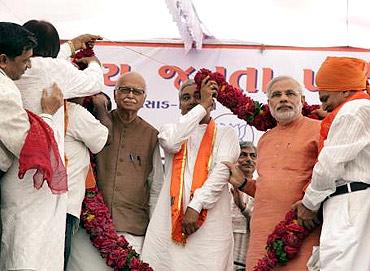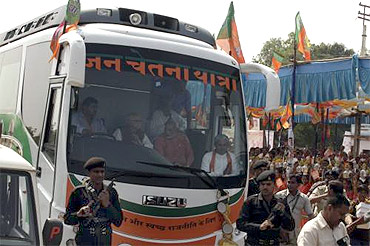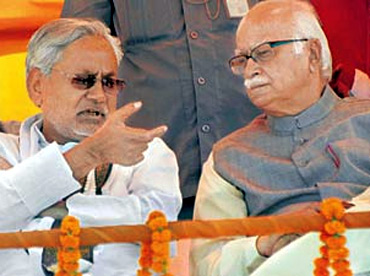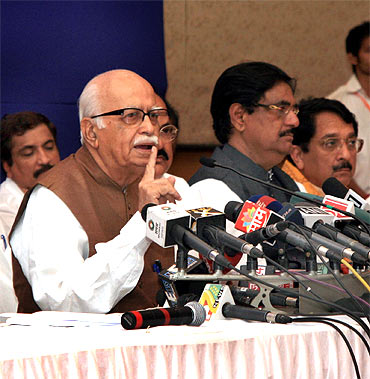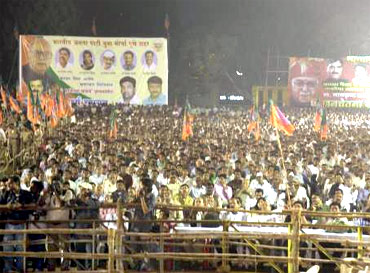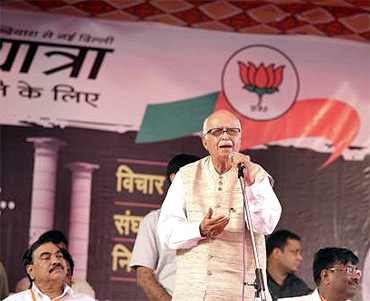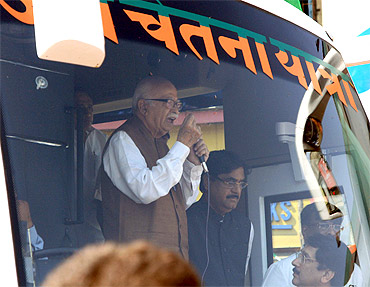 | « Back to article | Print this article |
RSS, BJP against Advani's last shot at PM's post
L K Advani had a greater chance of being accepted as a consensus choice for PM had he given up his claim for the post, feels Neerja Chowdhury
It was sometime in early 1973. A group of young journalists were meeting with Jai Prakash Narain and the place was Churu in Rajasthan.
JP had been instrumental in getting some dacoits to surrender. Given the situation in the country, the talk centred on the need to do something more -- kuch karna chahiye (something should be done).
JP's wife Prabhavati, protective of her ailing husband, shooed the scribes off.
But within months, the feeling had grown that the time had come "to do something". It took a more concrete shape with JP leading an agitation against spiralling prices, shortages and corruption in Patna, which ultimately brought the opposition together against the Congress government at the Centre led by Indira Gandhi.
When a series of scams began to hit the Congress last year, as in 1973-74, friends and well wishers of LK Advani -- like journalist Cho Ramaswamy and S Gurumurthy -- began to urge him to "do something " in the situation which had emerged, to put the ruling Congress on the back-foot.
CLICK on NEXT for more...
RSS was against the yatra
Advani too has hinted to media personnel more than once in recent months that he could undertake another yatra. Since he undertook his famous Ram rath yatra in 1990, yatras have been an expression of LK Advani's politics.
But, for whatever reason, Advani did not hit the road in 2010. When he announced the Jan Chetna Yatra in September 2011, it was like a fait accompli to his party colleagues. After the initial surprise, they fell in line and the yatra, against corruption and black money, was flagged off by Bihar Chief Minister Nitish Kumar at JP's birthplace on his birthday -- on October 11 at Sitabdiara.
It was not just Narendra Modi who was cold to the idea -- both Advani and the Gujarat chief minister view themselves as BJP's prime ministerial candidates -- though the two leaders shared the dais on Sunday as the 38-day-old yatra entered Gujarat.
The Rashtriya Swayamsevak Sangh was unhappy too, since the move was perceived as an attempt by Advani to throw his prime ministerial hat in the ring, and the Sangh seems adamant against that happening.
CLICK on NEXT for more...
Advani has not ruled out a bid for the PM's post
RSS agreed to the yatra on the condition that Advani needed to first clarify that he was not a PM candidate. The BJP patriarch made a statement which fell short of such a clarification. All through his yatra, he has not ruled out the possibility that he could be a contender for the top job.
The RSS went along with it, in the belief that the yatra would help the BJP recapture some of the political space it had ceded to civil society. It would help keep the issue of corruption on the front burner in the inter-session period of Parliament.
The fact is that Advani, even at 84, can still undertake a gruelling pan-India journey that few of his younger colleagues would be able to manage.
The yatra received an enthusiastic response in Bihar, where Nitish Kumar threw his weight behind it, as also in Chhatisgarh. It has also drawn crowds in the other states it has visited and according to party leaders, "Advaniji is not dissatisfied".
After the initial surprise, his party colleagues have supported it. BJP president Nitin Gadkari did not want to be accused of not putting his weight behind it and neither did the party's Gen X leaders, given Advani's seniority, as they did not want the party to come across as a divided house.
CLICK on NEXT for more...
RSS, BJP against Advani's last shot at PM's post
But hardly anyone compares the Jan Chetna Yatra to Advani's Ram rath yatra, which had brought about a paradigm shift in the politics of north India and was a major factor in catapulting the party to power in 1998.
A BJP wag summed up the situation, "This yatra is no more than any other programme of the BJP. (It is) like rallies against price rise. Once it is over, the attention will turn once again to the winter session of Parliament and then to the five state assembly elections."
It is difficult as of now to fully assess its gains, though the yatra has helped to galvanise the party cadre in the states it has visited, made the BJP more visible and reinforced the support of its core constituency.
But from all accounts, it has not led to Advani's projection as a rallying point of the popular discontent with the government over corruption and price rise. This had little to do with his advanced age, as Anna Hazare is in his seventies but has still clicked with the younger generation.
CLICK on NEXT for more...
Many believe that Advani should have give up his claim
Those who know Advani say that after 2009, he had hoped that if there was to be an anti-Congress revival, he would be the rallying point of the non-Left forces.
Many of his colleagues concede that if there is a mid term poll -- Advani does not rule this out -- the party may still be compelled to project him as a consensus candidate, though the RSS would be totally opposed to it.
A question which has mystified many in the capital's political circles is why a veteran politician like Advani did not give up his claim to prime ministership after 2009.
Had he done so -- and this is a view shared by many in the BJP -- and then undertaken a yatra against corruption, there is a chance that he may have become a symbol of the anti-graft and anti-government sentiment that is visible today.
Instead, leadership of this anger was usurped by civil society representatives like Anna Hazare and his team, who have tapped into this sentiment rather than create it.
CLICK on NEXT for more...
RSS wanted Advani to take on the role of a mentor
India still respects "renunciation". Former prime minister VP Singh, even though he had emerged as the alternative to Rajiv Gandhi during the 1987-89 period, wresting the title of Mr Clean from Rajiv, used to say repeatedly that he was not a prime ministerial candidate, even though it used to sound hypocritical to many at the time.
At one point, VP Singh even went to the extent of saying that he would be a disaster as the prime minister. But then he knew that a large number of Indians accepted those who were not seen grasping for power and they had a better chance of making it to the top.
Politicians know only too well that neither giving up a prime ministerial claim nor hanging on to it determines who becomes the PM eventually.
If anything, Advani had a greater chance of being accepted as a consensus choice for PM -- were such a situation to arise -- had he given up his claim.
By refusing to do so, he has riled the RSS further. Sangh sources say that they had agreed to him being projected as the prime ministerial candidate of the BJP in 2009, after he repeatedly raised the issue with them. The RSS went along with it only on the condition that if he failed to make it, he would give up his claim and take on the role of a mentor for younger leaders. They were surprised when he refused to do so.
CLICK on NEXT for more...
RSS may still not have forgiven Advani
The flipside of the story is that given his physical fitness and discipline and his vast political experience -- he remains the tallest leader in the party -- he should have been viewed as an asset. But for some reason, the Sangh really does not view him in that light.
The only explanation is that at the end of the day, the RSS has still not forgiven him for his statement on Jinnah and they do not trust him any more.
Given his 50 years in public life and his unparalleled contribution to building up the party, it must be really galling for Advani to be told by those younger to him -- whether it is the present RSS chief Mohan Bhagwat or his predecessor KS Sudarshan -- that he should virtually retire, when he is willing to play a role and is fit enough to do so, and the party could do with leaders with experience.
As far as the PM's post is concerned, the never-say-die Advani may feel there is no reason why he should be ruled out of reckoning. The trouble is that this idea is not clicking with the BJP or the RSS, or for that matter capturing the popular imagination.
